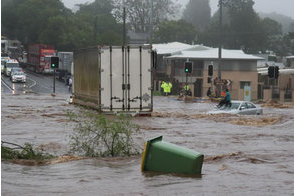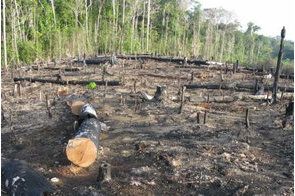How to cope with climate change vulnerability in Nigeria

Summary
Nigeria is among the countries most vulnerable to climate change, despite its comparatively marginal contribution of greenhouse gas emissions.
Climate change is the greatest threat the world has ever faced, according to the United Nations. It affects people worldwide, with impacts that are unprecedented in scale. Scientists have said even if greenhouse gas (GHG) emissions were to be halted today, the rise in global temperatures would begin to flatten out only after a few years. Nevertheless, temperatures will remain elevated for many centuries. This essentially means the impacts of global warming are irreversible for humans who are alive today.
Climate change is already impacting the lives of millions of Nigerians. Extreme weather events are occurring with more frequency and intensity across the country, affecting livelihoods, displacing populations, leading to loss of life, and causing economic losses. One of the sectors most disrupted by climate disasters is agriculture where floods and droughts have caused a drop in productivity, thereby contributing to rising food prices, hunger, and food insecurity.
Extreme weather events like heatwaves are posing health risks on Nigerians. A few months ago, increased incidents of heat strokes, dehydration, and other heat-related conditions and illnesses were reported. Climate change also affects biodiversity, resulting in habitat destruction and disruption of ecosystems that are vital for human well-being.
Nigeria is among the countries most vulnerable to climate change, despite its comparatively marginal contribution of GHG emissions. Among the factors for the country's vulnerability is the limited climate adaptive capacity and low levels of socioeconomic development. Nigeria lacks the physical and financial infrastructure needed to mitigate and bulwark the country against climate risks.
To adequately address the adverse impacts and consequences of climate change, there is an urgent need for comprehensive and continual climate risk assessments to help inform and improve adaptation policies. Developing frameworks for disaster preparedness and effective coordination and dissemination of early-warning messages is also key. Planning and investing in adaptation to boost the resilience of communities and economic sectors is very crucial. The country also needs to ramp up mitigation efforts to reduce GHG emissions.
Speaking on the climate disaster risks facing Nigeria at a workshop in Abuja on 31 January 2024, Director General/CEO, Nigerian Meteorological Agency (NiMet), Charles Anosike, said "Disasters pose significant challenges to our nation, and we must work together to enhance our coordination mechanism with disaster risk reduction and climate change adaptation for better understanding and communication of cost benefit." In February, NiMet released its 2024 Seasonal Climate Prediction (SCP) to serve as an early warning tool and enhance disaster preparedness for the year.
The SCP shows the continued variability patterns in rainfall during the rainy seasons in Nigeria. The report forecasts "below normal" amount of rainfall in some parts of the country, while others are likely to experience "normal to above normal" rainfall this year. The rainy season is expected to be delayed in some regions, especially in the north-central states. Other states, including Borno, Yobe, Jigawa, Sokoto, Kebbi, Kano, Kaduna, Bauchi, Cross River, Abia, Akwa Ibom, Ogun, and Lagos, are predicted to have an early end to the rainy season. The potential impact of such rainfall variability is the disruption of agricultural production, especially where there is no adequate planning and farmers have no knowledge of, or access to, climate-resilient farming systems and methods.
The 2024 Annual Flood Outlook (AFO) released in April by the Nigerian Hydrological Services Agency (NIHSA), in collaboration with NiMet and other stakeholders, shows the varying levels of exposure to flood disaster risk by different states of the federation. In the high flood risk category are 148 Local Government Areas (LGAs) across 31 states. The country is to expect severe flooding between April and November of this year.
Nigeria has been experiencing regular seasonal flooding, with the 2022 floods been the worst since the 2012 episodes. According to the National Emergency Management Agency (NEMA), the flood disasters in 2022 left over 2.4 million people displaced and caused 662 fatalities. The World Bank estimated the total economic losses at about $6.68 billion. This estimate includes the damage to infrastructure, residential and non-residential buildings, farmlands, and the impact on various productive sectors of the economy two years ago.
With changes in rainfall, increase in the intensity of floods, storms, and droughts, as well as rise in heatwaves, the poorest communities in Nigeria are disproportionately exposed to climate change-related environmental and health impacts. Therefore, adaptation policies should be intensified to build resilience in the most vulnerable communities and ecosystems.
Besides its SCPs and other meteorological forecasts, NiMet also frequently provides weather information on thunderstorms and extreme heat to protect Nigerians' lives and livelihoods. These are actionable information for the government and its agencies like NEMA, as well as businesses and individuals. Over the last couple of months, NiMet has issued several warnings due to extreme temperatures, cautioning Nigerians of potential heat-related illnesses.
While NiMet and its partners have demonstrated commendable commitment to timely release of accurate climate and weather information to Nigerians, the capacity of businesses and individuals to take adaptive measures to reduce disaster risks is limited. This begs the question of how people can achieve effective utility of weather information to boost their resilience.
For example, during extreme heat, people complain of not having electricity to turn on their air conditioners and fans at night. This affects their ability to sleep and consequently their health. Given the weak state of the country’s healthcare system, low-income people are unable to get adequate treatment for climate-related illnesses. Climate-induced conflicts have led to violent conflicts between herdsmen and many rural dwellers, leading to the displacements of the latter from their homes and livelihoods.
Mobilising funding for climate resilience is one of Nigeria's biggest challenges today. The country's adaptation and resilience (A&R) funding needs are estimated to be at least $120 billion up until 2030, with $22 billion investments needed immediately for policy and planning and other A&R initiatives, according to the National Climate Change Council (NCCC). Less than 1 per cent of this amount has been invested in the country for A&R. Clearly, the state of adaptation preparedness amid climate vulnerability and growing disaster risks is dismal.
Notwithstanding the enormous gaps in funding and preparedness that remain, key sectors of the Nigerian economy, particularly agriculture, which accounted for 33.6 percent of total employment (as of Q3 2023) should be prioritised for improved adaptation and productivity. Empowering farmers on climate and weather information utilisation is crucial to achieving this.
One of the ways to improve the utility of meteorological data is by making it easily accessible and timely to farmers through various channels such as local agricultural extension service providers, mobile apps, SMS alerts, and community radio. The channels can be tailored to suit the technological access, literacy levels, and language of the farmers. Such mediums can also be used to deliver real-time market information such as prices and supply chain logistics to farmers.
In addition, community-based networks and farmer cooperatives can be used as platforms for sharing knowledge, experiences, and best practices on weather-resistant crop varieties and farming techniques, irrigation, and technology adoption. Studies have shown that adopting innovative technologies and practices, such as improved crop varieties, precision farming, and climate-smart agriculture, can significantly boost agricultural yields and production. Ultimately, providing training to farmers on such practices and giving them the tools to interpret and integrate climate information will enhance their capacity to weather the adverse impacts of climate change.
Reducing financial barriers and risks for farmers is also an important strategy for climate adaptation. This can be achieved by developing innovative green financial products and services for farmers to enable them procure much-needed productive assets and inputs, and strengthen their capacity to adopt climate-smart agricultural practices. These and other strategies will reduce Nigeria’s climate vulnerability and improve the resilience of food systems to climate change and other shocks.
Martins Hile is a sustainability strategist and editorial consultant.
Related
-
Rockefeller Foundation, USAID invite entries on flood management in Africa and Asia
The Global Resilience Partnership is requesting for innovative ideas to build resilience to water challenges.
-
India’s sustainable eating habits offer hope for climate change mitigation
Sustainable eating comprises practices such as minimising food waste, prioritising plant-based diets, and consuming ...
-
Group advocates for progress on UN-REDD programme in Nigeria
The UN-REDD programme assists countries to develop the capacities needed to meet the requirements for carbon offsets, and ...










